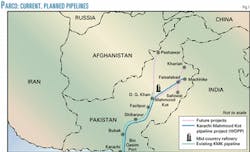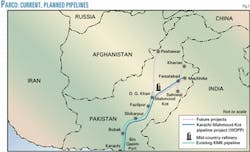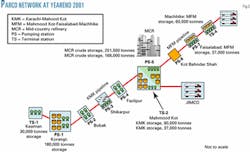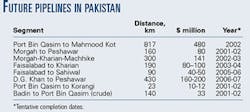Pakistan crude, products system expansions on track
Work is progressing in Pakistan that will expand crude oil and refined products delivery capacity. Plans by Pak-Arab Refiniery Ltd. (PARCO), Karachi, call for as much as 2,150 km (more than 1,300 miles) of new product and crude oil pipelines by yearend 2007, more than 2,000 km of which for refined product lines alone.
By yearend 2002, PARCO plans to have completed as much as 980 km, including 140 km of crude oil pipeline and a major 817-km white-oil product line. By yearend 2004, the company will complete 490 km of more product pipelines; and by yearend 2007, the remaining 520 km in product pipelines (table; Fig. 1).
Incorporated in 1974, PARCO is a joint venture between Pakistan, Abu Dhabi, and Austria. Pakistan holds 60%, while Abu Dhabi Petroleum Investment (ADPI) and OMV AG of Austria each holds 40% each.
In 2000, PARCO started up the 100,000 b/d Mid-Country Refinery (MCR) near Mahmood Kot, significantly increasing Pakistan's refining capacity and sparking a surge in refined products demand, especially for the northern part of the country (OGJ, Oct. 22, 2001, p. 54).
White oil project
PARCO's White Oil Pipeline Project (WOPP) follows conversion of the company's existing pipeline network for crude oil transportation. The white-oil pipeline will transport refined petroleum products to central and northern regions of Pakistan, which account for almost 60% of total petroleum consumption.
The project is being implemented by a new joint venture called Pak-Arab Pipeline Co. (PAPCO) in which PARCO has 51% equity interest with the remaining 49% being shared by Shell Pakistan BV (26%), Pakistan State Oil Co. Ltd. (PSO; 12%), and Caltex Oil (Pakistan) Ltd. (11%).
PARCO says the 817-km white oil pipeline will flow products from Karachi to Mahmood Kot (Muzaffargarh District; Fig. 2) along with related facilities at a cost of $480 million. The 26-in. line will be able to move 12 million tonnes/year (tpy).
Upon completion, it will consist of the following:
- A 1 km, 30-in. line connecting Fauji Oil Terminal Co.'s oil jetty to terminal and pumping station at the port of Bin Qasim near Karachi.
- The 817-km mainline between the terminal and pumping station at Bin Qasim and the terminal at Mahmood Kot.
- The terminal and pumping station at Bin Qasim consisting of main line pumps and storage tanks for 7 days' product storage.
- A pumping station at Bubak to be installed later as demand increases.
- A pumping station and storage facility at Shikarpur.
- A pumping station at Fazilpur to be installed later as demand increases.
- A terminal station at Mahmood Kot with storage facilities and connection to oil marketing companies (OMCs) at Gujrat and Mahmood Kot-Faisalabad-Machhike (MFM) pipeline system.
The communication system will be fiberoptic-cable based and a state-of-the-art programmable logic control (PLC)-based SCADA system.
To date
With completion of all pre-EPC (engineering-procurement-construction) activities and signing of the EPC contract, a letter to proceed was issued to China Petroleum Engineering & Construction Group Corp. (CPECC), the lowest competitive constructor, to start the EPC work.
Last month, PARCO told OGJ that right-of-way acquisition was in progress and that frontend engineering design (FEED) and detailed design had been completed.
EPC contractor CPECC had partially mobilized and had personnel working in Pakistan, China, and the UK.
At the same time, non-EPC work was also under way at all station sites. Included in this were earthwork and construction at Port Qasim, Bubak, Fazilpur, Mahmood Kot, and Shikarpur.
PARCO will be laying the pipeline from Karachi to Mahmood Kot at a cost of about $480 million. With the up-country demand for petroleum products rising at 10%/year, the company says total demand in the northern region will increase to 10 million tonnes in the near future.
With the total production capacity of the Mid-Country Refinery at 4.5 million tonnes, the pipeline will ensure smooth supply of these products, says PARCO. Pipeline capacity will start at 5 million tpy, building to ultimate capacity of 12 million tpy.
PARCO says current oil logistics of Pakistan require petroleum products to be transported through road and rail, as well as in existing product pipelines. "Movement of these products by road is not only dangerous for traffic but it can also cause extreme degradation to the existing road surface and human lives," says the company.
Pipeline transportation, on the other hand, is the "most efficient, convenient, and cheap mode of transportation besides being far more environmentally friendly."
More projects
To integrate the two ports of Keamari and Port Qasim with PARCO's up-country pumping facilities and "protect country strategic assets through optimal utilization of ports" for receiving and handling crude oil and petroleum products, PARCO expects to complete by yearend 2002 a 23-km pipeline between Port Qasim and Korangi.
In the more distant future, the company plans a 190-km products line between Faisalabad and Kharian in the north and a 90-km products line between Faisalabad and Sahiwal.
The company also plans another products line, 430 km between Mahmood Kot and Peshawar, near the Afghan border.



